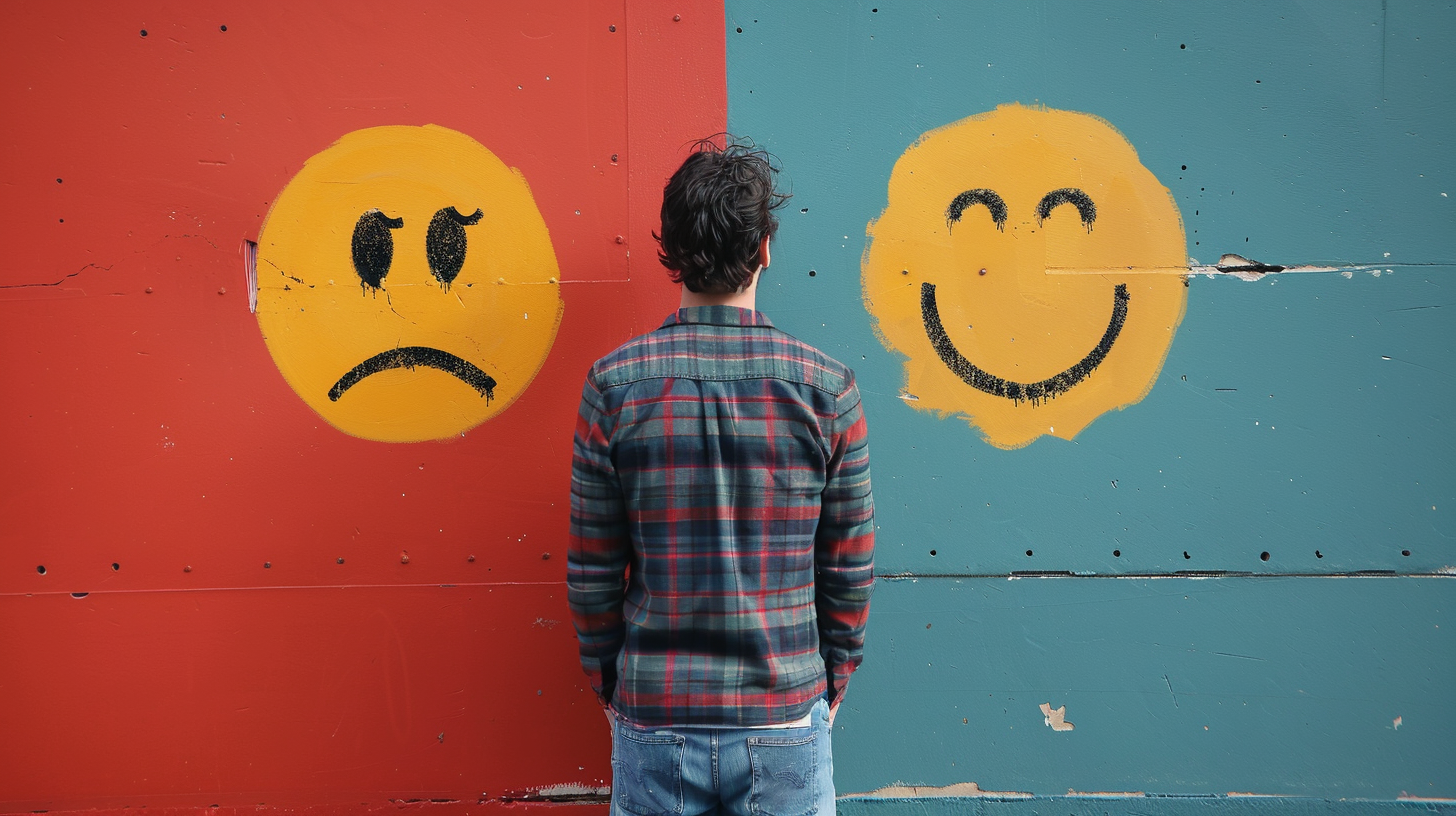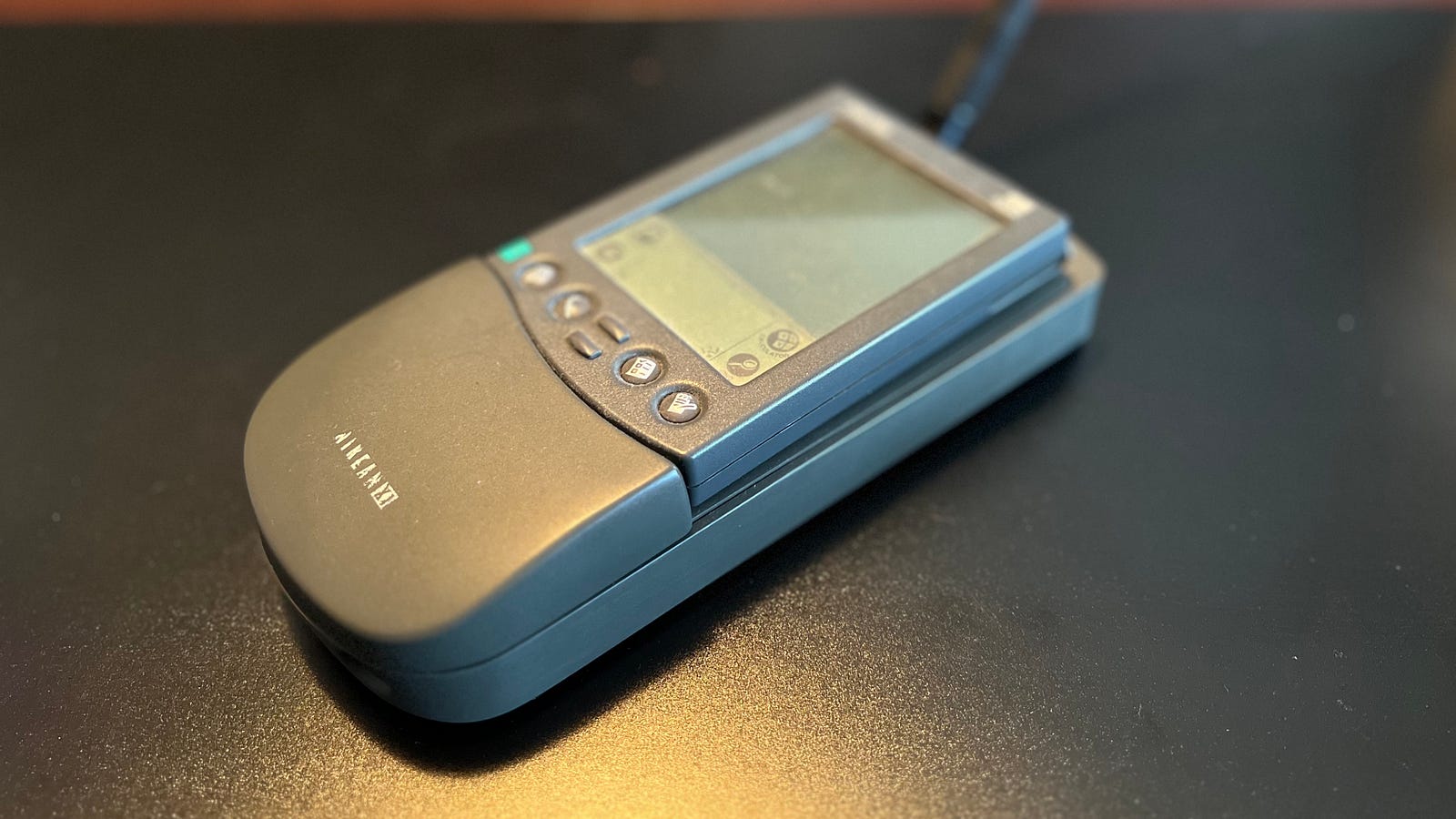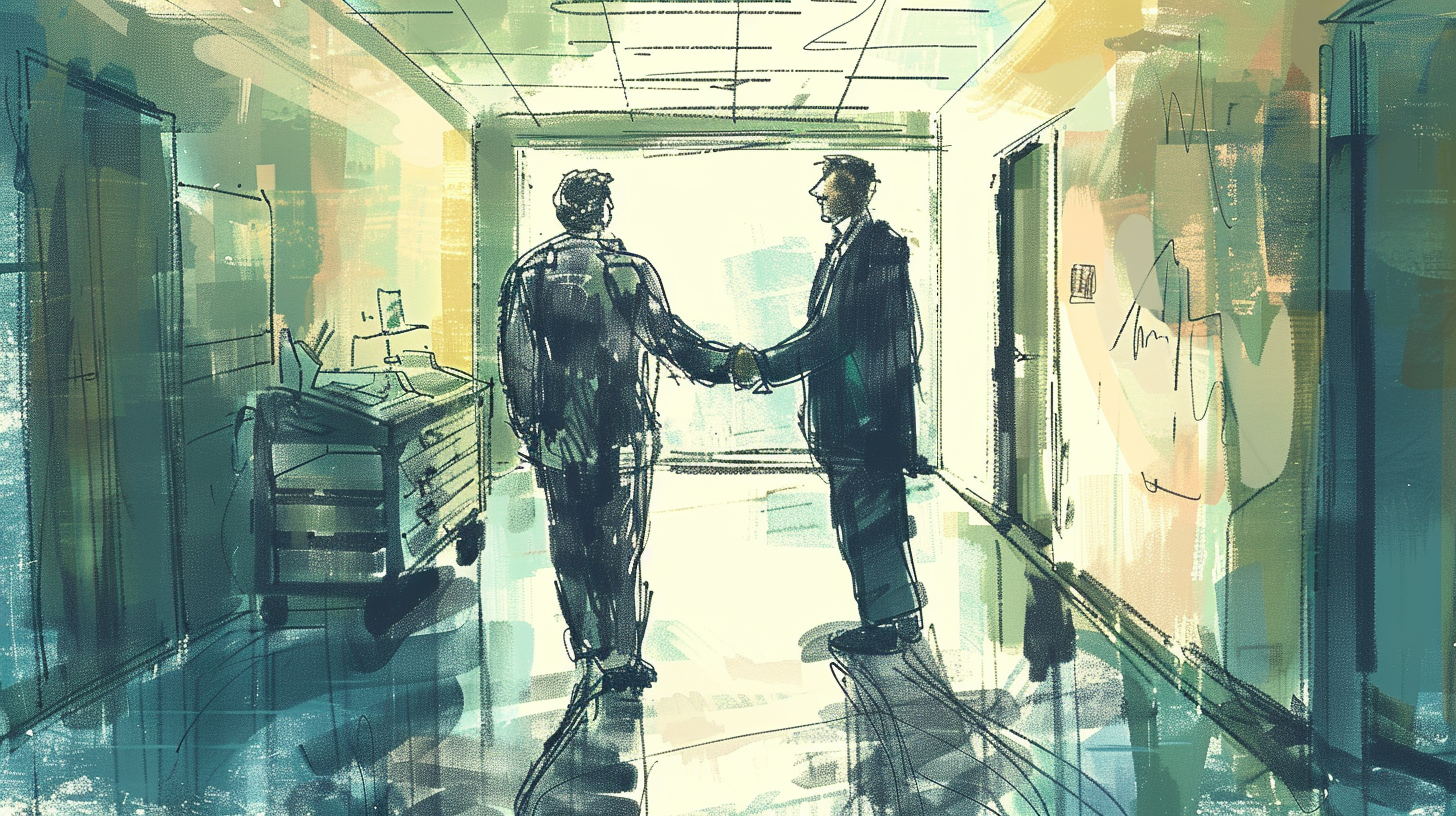- Sanjay Says
- Posts
- Yes, I Have Bipolar Disorder
Yes, I Have Bipolar Disorder
Acceptance is the key to happiness, and solutions

Which version of me is going to wake up today? — Midjourney
Sanjay glows
I was 30 years old when I started a company to make a mobile device that could send and receive emails, a few years before the first Blackberry came out.
I built a talented team of engineers and marketers. AT&T and US Robotics were partners. I had a working prototype. I had customers signed up. One friend told me over lunch, “Sanjay, it’s like there’s a light glowing from inside you.”
I was also only sleeping three hours a night. I was spending money on parties and five-star hotels instead of on product development. I was financing all this out of a joint savings account without telling my wife, and by maxing out cash advances on a half dozen credit cards.
In six short months, I crashed the company and I crashed into a deep depression. On the surface, it was a result of bad cash management and a lack of focus. The real story was a bit darker.

My product — a US Robotics Palm Pilot paired with a wireless modem — photo by author
Sanjay goes dark
I had to declare personal bankruptcy to wipe out $550,000 in debt. I got divorced, and at age 31 I moved back in with my parents. I had a three-year-old daughter that I wasn’t seeing, and I wasn’t making child support payments.
Despite the carnage I had created, I built a cocoon of peace in the bedroom I grew up in, sleeping 14 hours a day, reading, and eating my Mom’s home cooking.
After a month of this, my lack of interest in returning to society (and moving out of the house) got my parents worried enough to send me to a psychiatrist.
Dr. Jamal took copious notes during a one-hour session and came back with the diagnosis that I was not only depressed but that I might be manic-depressive or bipolar. I was taken aback and denied it. Manic depressives are crazy. I wasn’t crazy.
On the other hand, the depression diagnosis meant I wasn’t lazy — in fact, it was a great defense for all the times in my life that I didn’t feel like getting out of bed.
It is common with bipolar disorder for patients to seek help only with the depression cycle. The manic cycle is the destructive one, where you lose relationships and go bankrupt. But it’s also fun.
A non-traditional cure
My parents encouraged me to try various non-traditional treatments, including wearing a copper bracelet, keeping a lucky gem in my pocket, and seeking treatment by a yogi from India.
“Dad, seriously, a yogi from India? He’s not coming just for me is he?”
“No, no, he’s here to run some Hindu temple sessions. He’ll be staying with us at the house, though, and you should let him help you.”
“Okay, fine, I’ll try it, but not if I have to do yoga. I hate yoga.”
Two days later, the yogi showed up, and told my father, “I will sleep directly beneath your son, look at his picture, and think cleansing thoughts. That will help him to get better.”
After the yogi was settled in a bedroom one floor beneath me, my father came into my room and asked, “Son, could you sleep on the left side of your bed, so that the yogi can sleep in the bed below instead of having to sleep on the floor?” I scooted over to the other side of the bed and went back to sleep.
I didn’t get better, but the yogi’s temple got a nice donation from my family anyway.

I’m sure he tried hard, but he should have been sleeping a little more to the left— Midjourney
Is it depression?
Three months later I came out of the depression the same way I always had — gradually feeling better after getting lots of sleep. I got a great job in sales and began to work my way back from bankruptcy.
Unfortunately, I continued to suffer from what I considered to be depression cycles. I tried several medications over five years: Lithium, Wellbutrin, Celexa, and Effexor. Of them all, only Effexor worked, but it had side effects that made me stop taking it, in my case, a lack of pleasure in sex.
I was fortunate that I had a job with a lot of flexibility and an understanding boss, so I was able to have a somewhat normal life, but I was prone to anger fits and had problematic relationships with colleagues, alternating with periods where I would cancel meetings and stay in bed all day.
Admitting the problem
My parents continued to worry. My ongoing depression cycles were interspersed with brief periods of over-the-top enthusiasm, and a few weeks after a disastrous Las Vegas gambling trip where I lost $30,000 playing poker, I received a message from my father. He had gotten the name of a leading mental disorders specialist in Boston and had e-mailed him asking him to take on my case.

As a father myself now, I understand the pain my parents must have felt when I wasn’t well — Midjourney
The specialist replied that he couldn’t get involved in a Canadian case, but suggested I get in touch with a colleague in Toronto, Dr. Sagar Parikh. Dad then forwarded that e-mail to Dr. Parikh and asked him to take me on, which Parikh did, on the strength of the referral from Boston, not realizing that the Boston doctor had no idea who I was.
When I got the message about seeing Dr. Parikh, I called my father and said, “Dad, I got your referral e-mail, but I don’t see the point of another specialist. I’ve decided that psychiatrists are all quacks who couldn’t get into a real specialty.”
My daughter is now a talented and dedicated psychiatrist. I have revised my opinion.
My father patiently said, “Son, I’ve been speaking with Dr. Jamal, and he still says that you might be bipolar. I know you don’t want to hear it, but maybe it would help to talk to Dr. Parikh about it. I want you to go see him. Please.”
I provided Dr. Parikh with all the details about the lead-up to my bankruptcy, which I did not do with previous specialists. Since he was a renowned researcher, I believed he would recognize that I wasn’t bipolar and that he would help dismiss any notion that I was manic-depressive.
Parikh’s diagnosis was immediate. “Sanjay, you’re Bipolar I, the most serious form of the disorder.” He added, “I know you don’t think you’re bipolar because there has only been the one obvious incident, but from your history, I believe there are several others — just not as severe and not as recognizable. The diagnosis, though, is always based on the most severe episode.”
I insisted, “But I can’t be bipolar. I’m not crazy.”
“No, you’re not crazy,” he said, “Being manic-depressive is a chemical imbalance, like many mental disorders. It can be treated, and it can be managed. I can’t force you to take the medication; you have to make that decision.”
Most clinicians now believe that mental disorders are not caused by a chemical imbalance, but are a body’s natural response to a traumatic situation.
I negotiated, in an attempt to avoid medication. I said, “I was excited about my business idea, maybe I’m only hypomanic, Bipolar II?”
Parikh stared at me.
“Okay. I’m bipolar. Can you help me?” I asked.
“I see from your medical record that you had a negative reaction to Lithium when you took it. Here’s a prescription for Lamotrigine,” he said, handing me a sheet of paper. “It’s an anti-epileptic medication that has been found to be effective in treating bipolar disorder. Let’s give it a try.”
Lamotrigine as a treatment for bipolar was novel then, but is now the gold standard for treating bipolar disorder with long depressive cycles.
I took the medicine for two weeks. No side effects, but no effects either. On the fifteenth day, I woke up and suddenly felt a heck of a lot better. I saw Parikh again, and he said, “Okay, come see me if you encounter any problems, and good luck.”
I only saw Dr. Parikh one more time, 20 years later. He had moved on in his career and was doing research in the US, but was visiting Toronto to attend a conference. I had recently sold my company, and I met him for the sole purpose of thanking him for what he had done for me all those years ago, and to let him know I was doing not just well, but pretty damned great.

Thanks, doc, I couldn’t have done it without you. Now, can we talk about insurance? — Midjourney
Reducing the stigma
I was still embarrassed about my diagnosis though, and when I met the woman who was to become my wife, I didn’t mention that I was bipolar. I told myself that I didn’t have to talk about it because it was no longer an issue. That I had it under control. But really, I still felt stigmatized.
I didn’t want to admit there was something wrong with my head.
After we were married and she asked me about the various medications I was taking, mostly for heart disease — I finally confessed. She wasn’t happy that I had hidden it from her.
As I’ve become more successful, I’ve opened up more about my difficulties and my mental struggles. My bipolar disorder doesn’t define me. If anything, I’m defined by getting past it.
There is nothing more important than your health, it should always be your number one priority. And in addressing health issues, you should always start with mental health, because warped feelings and thoughts can only lead toward self-destruction, not toward self-improvement.
Put on your own mask first, and then help others. If you’ve had challenges with mental health, tell your story, and you’ll be helping to reduce stigma and spread solutions.
In my case, talking about bipolar disorder and depression has allowed many people over the years to approach me, admit they have the same problems, and ask for help. Because there is one message that we all need to hear before we can get better.
That we are not alone.

You are not alone. Ask for help. — Midjourney
End note
I now keep a journal, meditate, and do yoga. These practices keep me balanced and grounded, but it required years of psychedelic and Internal Family Systems therapy to get me into these habits. I wasn’t able to get there directly from my earlier, less mindful self.
I am a proponent of psychedelics, but with bipolar disorder they are sometimes considered to be dangerous because they might trigger a manic episode. Medicated on Lamotrigine or not, I have not found this to be the case, and there are no known episodes in clinical trials of someone with bipolar disorder going into psychosis or mania as a result. It is a fear, not a fact. Do your own research.
Stay safe.
I write so I can connect with my readers. You can reach me by responding to this email, or responding to the poll below.
Thanks for reading!Anonymous feedback appreciated, what did you think of this post? |
Reply